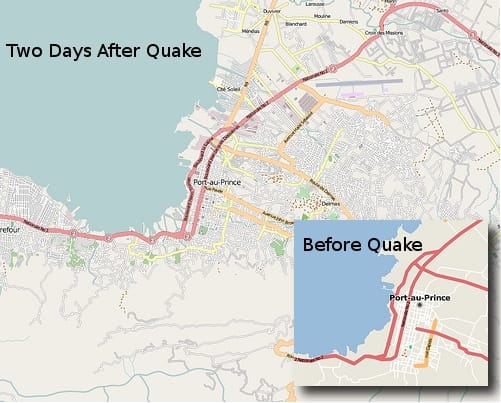News Roundup - Geodesign, ArcGIS 9.4 Goes to 10, Haiti Disaster Response
What follows is notable news and happenings that I want to purge from my bookmarks folder. It will be a combination of things you already know spiced with things you probably won’t care about. I apologize in advance.
First up is geodesign, which has had an ESRI summit and a brand new Wikipedia entry. What is geodesign you ask?
Geodesign is a set of techniques and enabling technologies for planning built and natural environments in an integrated process, including project conceptualization, analysis, design specification, stakeholder participation and collaboration, design creation, simulation, and evaluation (among other stages). "Geodesign is a design and planning method which tightly couples the creation of design proposals with impact simulations informed by geographic contexts."So it's....basically all the stuff we've been doing for years. GIS as a field tends to have random taxonomy/nomenclature fluctuations. Remember when we become geospatial people instead of geographic people? Did it change your life? Neither will this. Moving on.
As was widely reported, ArcGIS 9.4 has been re-branded as ArcGIS 10. The big changes here are the merging of ArcCatalog and ArcMap (ArcCataMap?) and, like it or love it, the adoption of the MS Office ribbon interface. That’s enough for a major version number change in my book.
Haiti dominated the news this month, and there are a couple of projects helping out that I want to highlight. In particular, check out what people did on OSM in just a few short days.
Hats off to everybody that worked around the clock to update that area. Via Red Hat’s new opensource.com, a couple of other great FOSS projects that have been helping out in Haiti are Ushahidi and CrisisCamp. Proprietary vendors have historically been very gracious in putting aside licensing and cost concerns during crises, but it’s always quicker when those things aren’t an issue at all.
On the browser front, Chrome passed Safari and is the #3 browser on the web. I never thought I’d see the day I’d use something other than Firefox as my main browser, but I’ve been using Chrome 90% of the time lately. It’s significantly faster, generally stable, and now that the extension ecosystem has taken off I find myself opening Firefox less and less. Sigh. I think Chrome is helping Firefox get out of a rut though. Since it came out Firefox has sped up significantly, and now they’re moving to rolling release schedule to push out improvements more quickly.
A couple of interesting developments in the FOSS world this month. California is taking steps to define and encourage open source software use in government. From what I can tell it looks like what I consider the best policy - to put FOSS on the same level as proprietary solutions, not grant it special favoritism. There was an interesting story from New Zealand this month about a school that went almost completely open source (some virtualized Windows desktops are still there). As tight as school budgets are I’ve never understood how that happens so infrequently.
Via Slashdot, the map of the month goes to the New York Time’s interactive map of Netflix queues by neighborhood. Check it out now before the news industry points a paywall gun at its head and kills itself.
And finally, as both a Linux geek and a remarkably unaccomplished guitarist, I couldn’t pass this up without a mention. Behold - the Gentoo guitar!
Can I has? Pleaseeeeee?

